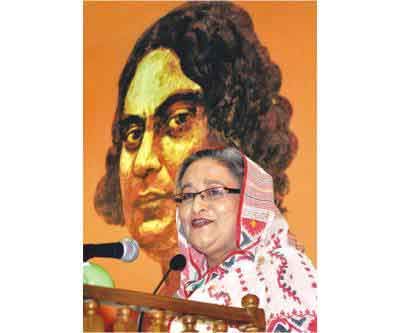Translate works of Nazrul: PM

Prime Minister Sheikh Hasina speaks at an event held on the occasion of Poet Kazi Nazrul Islam's birthday. Photo: PMO
Prime Minister Sheikh Hasina yesterday urged all to work for building such a Bangladesh where every citizen will enjoy equal and basic rights breaking the vicious cycle of poverty as dreamt by National Poet Kazi Nazrul Islam and Bangabandhu Sheikh Mujibur Rahman.
She said, “We want to build a Bangladesh where every citizen will enjoy equal and basic rights. There'll be no difference among the citizens. Women will enjoy their just rights. I urge all to work towards building such a Bangladesh.”
The prime minister was speaking at the inauguration of Bangladesh-India Joint Celebration of the 90th Anniversary of the great poem 'Bidrohi' and Celebration of 113th Birth Anniversary of Poet Kazi Nazrul Islam held at the Bangabandhu International Conference Centre.
Indian Minister for Law, Justice and Minority Affairs Salman Khurshid spoke on the occasion as a guest of honour. State Minister for Cultural Affairs Adv Pramod Mankin and granddaughter of the poet Khilkhil Kazi spoke at the programme held with Information and Cultural Affairs Minister Abul Kalam Azad in the chair.
Professor Emeritus Rafiqul Islam, chairman of the Trustee Board of Nazrul Institute, delivered the commemorative lecture. Cultural Affairs Ministry Secretary Suraiya Begum gave the address of welcome at the joint celebrations organised by the cultural affairs ministry.
Mentioning that Nazrul's thoughts inspire people in every sphere of life, the prime minister said Nazrul and Bangabandhu were at the same horizon ideologically and philosophically.
“Nazrul had desired to build an exploitation-free society. Bangabandhu had also dreamt of building Sonar Bangla free from exploitation and poverty,” she said.
Paying rich tributes to the National Poet, the premier said the 'Rebel' is an immortal creation of poet Nazrul. He wrote the poem in December, 1921 and it was published in the 'Bijli' in January, 1922. “The 'Rebel' is one of the best poetry works of the world.”
“Nazrul brought not only a rebellion, but also a revolution in the Bengali poetry,” she added.
The prime minister said the life and works of the greatest Bangalee of all time Bangabandhu Sheikh Mujibur Rahman were highly influenced by Nazrul.
“Both are rebellious--one through literary works and another through politics. Both had fought for realising people's rights. Both were highly vocal against communalism and religious fundamentalism,” Hasina pointed out.
Hasina said Nazrul is the poet of equality, the poet of non-communalism. People of all classes and strata, irrespective of religion, caste, creed and rich and poor, were equal to him. “Nazrul is our close kin in our time of joys and sorrows.”
Urging all concerned to translate the works of Nazrul into all popular languages of the world, the premier said the government would provide all necessary support to this end.
She said Nazrul Institute has already published some works of the poet in English, French, Latin, China, German and Hindi languages. A programme has been undertaken to translate some of his works into Arabic.
She said a memorial centre is being built at Dharmasagar in Comilla in commemoration of Nazrul. “Such centres will also be built in Chittagong, Sylhet, Rajshahi and Teota of Manikganj,” she added.
In his address, Salman Kurshid said India is committed to building a strong and multifaceted partnership with Bangladesh and to addressing all issues in a constructive and positive spirit.
“There're vast opportunities that await us and we should exploit these together for our mutual benefits. The celebrations today should guide us to explore new avenues of cooperation,” she added.
Salman Kurshid also said Kazi Nazrul Islam was a versatile genius, a son of India and the National Poet of Bangladesh. “He (Nazrul) has remained a bridge between our peoples and a symbol of our shared heritage,” Salman added.
Earlier, the prime minister handed over the Kazi Sabyasachi prize to veteran reciter Kazi Abu Zafar Siddiqui, the descendant of poet Kazi Nazrul Islam.

 For all latest news, follow The Daily Star's Google News channel.
For all latest news, follow The Daily Star's Google News channel. 




Comments